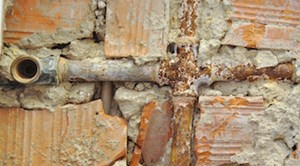Viken successfully pilots new lead pipe detection technology for buried water service lines
(UI) – Viken Detection, a manufacturer of detection tools for public safety agencies, announced its success in piloting a new technology for lead detection in buried water service lines. The company now seeks agency and commercial partnerships for faster deployment, given the urgent threat to children’s health.

The Bipartisan Infrastructure Law provides $15 billion of direct Federal funding for lead service line identification and replacement through the Drinking Water State Revolving Fund (SRF), and up to an additional $12 billion in funding for eligible lead pipe replacement. According to the Biden-Harris Lead Pipe and Paint Action Plan, it is estimated that up to 10 million households and 400,000 schools and childcare facilities are supplied water through service lines containing lead. The EPA, through its proposed Lead and Copper Rule Improvements (LCRI), would mandate 100% lead service line replacement.
Viken’s patent-pending technology offers an innovative means for lead pipe identification and targeted removal. Viken’s real-time in-pipe detection techniques for buried lines combined with on-pipe analysis not only ensures safer and more reliable inventorying and removal of fully (or partially) lead-contaminated lines, but also minimizes disturbances to the removal sites and inconveniences to the surrounding communities.
“The continued existence of lead service lines in the drinking water supply is a serious child health issue. It is encouraging that the federal government is prioritizing lead decontamination in drinking water to make sure water crises like in Flint, Michigan are not allowed to persist,” said Jim Ryan, CEO of Viken Detection. “Viken remains committed to offering affordable, safe, and effective solutions to tackle today’s most imminent threats. Ensuring all children have access to lead-free drinking water can happen much faster than we think.”
Viken is seeking state and municipal water agencies, academic institutions, and commercial partners to advance the implementation of its technology.
Related News
From Archive

- Glenfarne Alaska LNG targets late-2026 construction start for 807-mile pipeline project
- U.S. water reuse boom to fuel $47 billion in infrastructure spending through 2035
- $2.3 billion approved to construct 236-mile Texas-to-Gulf gas pipeline
- Major water pipe break in Puerto Rico hits over 165,000 customers
- Potomac River Tunnel project enters construction phase beneath Washington, D.C.
- Pennsylvania American Water launches interactive map to identify, replace lead water service lines
- Trump's tariffs drive $33 million cost increase for Cincinnati sewer project
- Utah city launches historic $70 million tunnel project using box jacking under active rail line
- Tulsa residents warned after sewer lines damaged by boring work
- Fatal trench collapse halts sewer construction in Massachusetts; two workers hospitalized



Comments